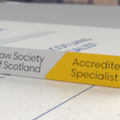Everyone will have different career ambitions and big firms in the legal profession are adapting more and more to accommodate the preferences of their workforce.
When trying to decide what role might be right for you in future, consider what aspects of working in legal practice you enjoy. For example, is it people management, strategy, the commercial side, technology or black-letter law that interests you most?
To some extent, everyone in a law firm has a responsibility to hit commercial targets and play a part in maintaining the business-side of a law firm. However, different roles will demand different contributions when it comes to business skills. If you're keen to pursue partnership, bringing in business is essential, as is contributing to the strategic direction of the firm. Dependent on the type of partnership you want, you may also own a stake in the firm. Other roles like Legal Director don't require buy-in, but they will require business and people management skills. Some Professional Support Lawyer roles, dependent on the firm, may have a greater focus on black-letter law than business development.
You might also decide that you're quite content in a role and perhaps you might be more likely to chase career progression at another stage of your career, or within a different type of organisation.
Career progression in big firms
A lot of people see career progression in big firms being a standard process, however it varies dependent on the firm. Some will have very set progression structures and you'll be able to find out the expectations and bands from HR or someone else within the firm.
Other firms may have a more flexible promotion structure, or include other roles.
Evidently due to the pyramidal shape of law firms, not everyone will progress, either through choice or their fit for the role, to partnership.
But what about roles that don't feature on this traditional pathway?
Alternative roles in big firms
Each big firm is different and so will be the job roles on offer. This information is designed to give an overview of the types of positions available, but it may be that if you want to pursue a specific career path, you need to look outside your own firm.
Legal Director
A Legal Director sits on the management team of a firm, generally just below partnership level. Legal Directors may be more or less common dependent on the firm you work for.
Prospective Legal Directors may need to demonstrate many of the same skills and attributes as partners, in addition to perhaps advanced specialisation in a field, or experience in strategic planning and decision-making.
There are two main reasons people might be interested in a Legal Director role.
Firstly, it can offer an role involving a lot of responsibility, but without some of the demands of partnership. This role demands you participate in the wider life of the firm, rather than just your immediate team. In some firms more Legal Director roles have been added in response to people seeking alternative roles to partnership.
Secondly, being a Legal Director could act as a stepping-stone to being a partner. With higher levels of responsibility than a senior associate and increased visibility of the firm's operations, you may be able to hone the types of skills required of prospective partners.
Professional Support Lawyer
Many big firms now employ professional support lawyers, often at a senior level like senior associate or partner.
Professional support lawyers are expected to provide an enhanced level of expertise and knowledge in a specialist area. This can allow the firm to offer a high level of service to clients but also allow internal teams to work more efficiently, as specialists can offer support on aspects like case law, new legislation and keep up to date with relevant research.
The role of a professional support lawyer may be quite varied. It might include providing practical guidance to colleagues, but may also play a key role in case strategy. It may also include delivering training to colleagues on new developments in a specific field, or working on growing the firm's business in their area of specialism.
Often the internal demand for professional support lawyers can grow in response to business need.
Legal technologist and innovation roles
Some law firms have innovation teams to focus on driving technological solutions forward to deliver client services.
These teams might comprise a mix of lawyers and tech experts, in order to collaborate on technological solutions. Lawyers are critical to these teams, as they bring a breadth of practical and technical legal knowledge and experience. This might include knowledge of processes, client service, procedures or risks, among other elements.
Lawyers working in innovation teams require a curiosity towards technical solutions and an interest in being at the forefront of development. Lawyers may work alongside developers, so the lawyers themselves don't need the same technological skills. Instead, collaboration skills are crucial.
Some roles will require digital and technological expertise. Indeed, some firms recruit legal technologists as a fusion role between legal and digitial skills.
Find out more about becoming an Accredited Legal Technologist. This allows professionals to gain recognition as a specialist through our scheme.
Consultant
Becoming a consultant allows you to work as a freelancer for a firm. Much of the time, consultants may have worked for or with a firm for a period of time to develop a relationship with them.
Some lawyers choose to become consultants later on in their careers and it gives the option of working part-time hours or on specific cases.
Freelancing is an option for people at any stage of their career, although it may be harder to secure work as a consultant without a significant amount of expertise and a strong reputation.
You can find out more about freelancing on this page of our website.
The best way of finding out more about consultant work specifically is to speak directly to consultants who work with your firm. They will be able to share their experience and possibly be able to act as a mentor if it's a career move you are considering.
Career planning
If you are looking to proactively develop your career, there are several things you can focus on to optimise your personal development.
Make your intentions known
If you know where you want to take your career at your firm, speaking to people about it is critical. Sometimes it can take a while to work towards a promotion, so you need to get advice at the start of that journey, rather than when you are desperate for a new role. HR or your line manager will be able to signpost you to specific skills, training or experience that you need to develop for specific positions, which will help you map out a career plan.
Develop a network of support
As well as your manager, a network of support can be really beneficial to you.
A mentor can help you navigate career growth. A mentor might be someone who has already gone down a path you want to pursue and they can share their experience, or it might be someone who is an objective sounding board who can help you consider your options. Many firms offer internal schemes, or we offer a free mentoring programme at the Law Society, which any member is eligible to join.
It's also useful to have a network of internal contacts in different teams, or at various levels of the business. If you work closely with them, they can act as a 'champion' for you, or offer opportunities to get involved with the firm in different ways to allow you to develop new expertise. You can learn a lot from colleagues, whether that links to behaviours, values, skills or anything else.
External networks are also essential, as it's critical to know what else is happening in the legal world. Understanding different ways businesses can work is important for evolving internal working practices and driving change and comparing your experiences with external peers can be useful. Also, you might not want to work for your firm forever, so your external networks can give a useful perspective on other opportunities that might arise.
Growing your skillset
The skills you'll need to develop will evidently depend on the type of role you're aiming for, in terms of its emphasis on things like business skills, financial capabilities or technical legal skills.
When you have identified the areas most important to your career development, seek out relevent CPD and training opportunities proactively.
As many skills required for senior positions within professional services are transferable, you can also look outwith the law. There are many courses available ranging from very specific Massive Open Online Courses (MOOCs) delivered by platforms like FutureLearn. There are hundreds of companies out there offering training on everything from tech skills to business development or people management.
Seek feedback and develop resilience
One of the most important things you can do is push yourself if you're trying to learn and develop. Crucially, you need to be open to not doing things right the first time and getting the chance to learn from your mistakes. Resilience is often one of the skills most prized in employees and a positive response to challenges and failures is the only way you can build this up.
Make sure to always seek feedback and take constructive criticism on board. Especially if you have spelled out that you are aiming for a promotion or transition to a certain role, colleagues can tailor their learning points to help you get there. In the majority of cases when it comes to career development it's not always smooth sailing, but the hard experiences often end up being the most productive in terms of personal development and resilience-building.
Attributes and traits
Focus on developing yourself for the job you want, rather than the job you have. Not all firms will look for exactly the same attributes in the same quantities in their potential managers and leaders and some traits may be more valued than others. You'll be able to understand more about this by analysing your company culture and values, as well as thinking about what attributes you admire in colleagues around you.
Attributes and traits are different to skills, as a lot of the time they might be linked to your personality and drivers. However, that doesn't mean personal development isn't possible. For example, confidence can come from navigating challenges. Curiosity can become a habit. Emotional intelligence and leadership can be fostered by learning from others.

Career mentoring scheme
We run a successful career mentoring scheme, which supports those hoping to advance their legal careers. Find our about becoming a mentor or a mentee.

Accredited Specialisms
Want to know more about becoming accredited?

Employability advice
If you're looking for a job, make sure you have the basics right. Use our guidance for writing a great CV, completing applications and preparing for interviews.



